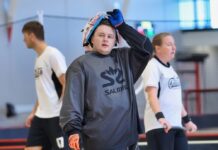More than half of lesbian and gay parents have encountered negative remarks about their families, with 48 per cent concerned that their children might face bullying at school, new research reveals.
A report by Just Like Us indicates that over a third of lesbian and gay parents have been subjected to intrusive questions, such as strangers inquiring about their child’s sperm donor. This figure rises to 39 per cent for lesbian mothers.
Surveying 1,012 parents nationwide, the charity also found that 42 per cent of children with LGBTQ+ parents have experienced comments about their family structure.
Amy Ashenden, the director of communications and engagement at Just Like Us, commented, “As an LGBT+ parent, compiling this report has been far from reassuring. Some findings are harrowing. There is clearly much work to be done to help schools and nurseries understand the significant impact that an inclusive—or unaccepting—school environment can have on LGBT+ families.”
“My baby is only ten months old, but I’m already worried about the negativity she and our family might face when she starts nursery and school in the future. It’s an anxiety many of us share as LGBT+ parents.”
One pansexual mother expressed her concerns about her children attending secondary school after they had faced negative comments during primary school.
Shelley, who wished to remain anonymous, said, “My partner and I are two pansexual mums of a 6-year-old boy and a 10-year-old girl. When our daughter was in reception, we received many negative comments, mainly from school staff.”
She recounted an incident where her wife was asked to drop something off at school, but Shelley wasn’t informed beforehand. When she explained that she hadn’t spoken to her wife, she was met with, “Well, you’re two women, so pretty much the same person anyway. What does it matter?”
In another instance, a teacher told her child, “It’s not that you don’t understand, you just can’t be bothered. That’s what you get for having two mums,” when she asked for help with her work in year one.
Shelley added that older students had even come to their home shouting homophobic abuse and had set a newspaper on fire and pushed it through their letterbox.
“We do worry but try to put it to the backs of our minds because we don’t want our children to pick up on it. I’m worried about when my children go to secondary school; I don’t want them to be bullied for having same-sex parents,” Shelley said.
She expressed a desire for schools to discuss same-sex parents more openly and casually so it becomes normalised.
The research also revealed that one in 10 LGBTQ+ parents feel “let down by my child’s school not being LGBTQ+ inclusive”.
A third of all LGBTQ+ parents reported that their school refers to families as “mums and dads” by default, while only one in five said their school would “openly discuss LGBT+ families with pupils”.
Additionally, a quarter of lesbian and gay parents said their children have felt “upset or hurt by negative comments at school about LGBT+ people,” and 24 per cent noted their children had been “left out of social arrangements seemingly because they are from an LGBT+ family”.
Moreover, 27 per cent of lesbian and gay parents reported being excluded from parental social arrangements due to their LGBTQ+ status. This number rises to 41 per cent for transgender parents. A third of transgender parents also reported hearing negative comments about trans people at school, and one in 10 have chosen to homeschool their children to avoid anti-LGBT+ prejudice.
Even those parents who had positive experiences at their children’s schools reported ongoing concerns about potential bullying.























